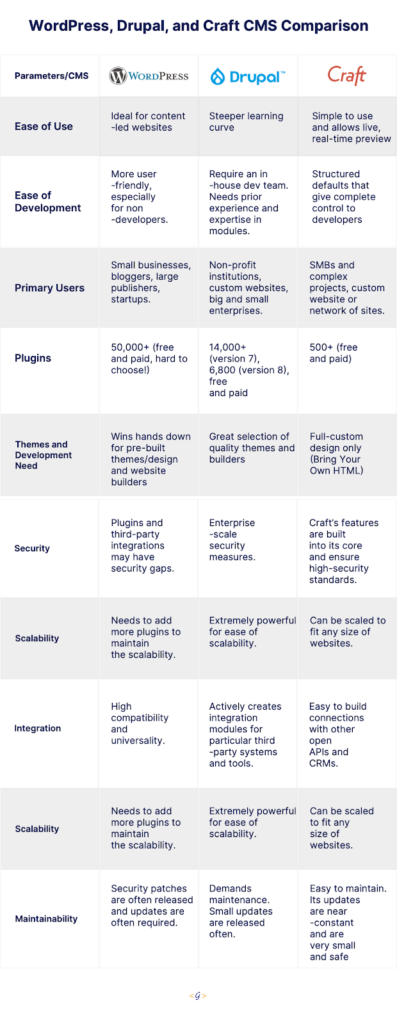This article is an assessment and comparison of the popular content management systems WordPress, Drupal, and Craft. We’ll dig into each CMS platform’s features, ease of use, the types of businesses that are best suited to the platform, and more. We’ll also walk you through the use case scenario of each CMS and will help you understand which one could be right for your business and goals.
Before we explore the nuances of each CMS, let us quickly introduce the three stalwarts in the CMS arena.
WordPress
WordPress is an extremely versatile CMS that facilitates users (even non-developers) to create feature-rich websites and ecommerce portals. It is completely customizable, mobile-optimized, and SEO friendly. It’s also open-source, making it completely free, redistributable, and offers unlimited validity.
The most popular CMS platform powers more than 40% of the websites available on the internet. It also offers thousands of free and paid themes and plugins that the developers can choose from.
Drupal
Drupal’s open-source model encourages continuous improvement and innovation through the support and passion of the Drupal community. With a pool of diverse experts regularly working to make Drupal better, the possibility to create exceptional digital experiences expands far beyond what a single team of proprietary software developers could dream up.
Recent versions of Drupal have also prioritized user experience (UX) to empower everyone from the site editors to content creators and to build powerful customer experiences.
Craft
Craft CMS is a content management system similar to WordPress. The interface is a simple, more stripped back version of WordPress, built and tailored to the needs and requirements of the business. This simple view makes updating and adding content a much more seamless experience.
For some, this adds an increased level of comfort when migrating over to Craft due to the out-of-box understanding developers, designers, and writers are likely to have.
Comparison — WordPress, Drupal, & Craft CMS

Below are the brief use cases for each CMS, showcasing when and how the three of them are being used to help you decide which one suits your business needs, size, and scalability.
WordPress
One of the common misconceptions about WordPress is that it’s mainly for creating blogging sites. WordPress was developed as a blogging platform, but that is ancient history now. The platform has evolved radically with the various new releases over the years.
The good news with WordPress is that it is extremely flexible. It can be adapted for ecommerce websites, corporate websites, communities, and forums. WordPress is an ideal fit for startups as well, as it allows them to start small and then scale up to run even enterprise level organizations that span many countries and continents.
All you need are suitable plugins and themes. So, for instance, if you wanted to make an online portfolio for your web design business or even a blogging site, you could go with the provided themes. You can alter its source code to customize your website’s look or functionality!
You have a choice of adding extra oomph to your website by opting for customizations.
For example,
You may have a website that includes a design that should be converted to HTML, CSS, and JavaScript — being three different “technologies”, and be mobile friendly as well. That design is then integrated into a WordPress theme. Whereas all dynamic components such as menus, sidebars, footer widgets, and general content areas should be connected and coordinated with the backend.
Several custom features are then built as custom plugins by a back-end developer, who should be aware of the front-end specifics and business needs through a manager. That final product is packaged and then hosted on a specific server environment.
It will require an extra pair of hands further when it comes to security (having more people able to tackle an assignment and a project manager in charge), having potentially higher code quality when a bunch of people carry out code reviews. This process includes automated testing and ongoing scalability given the diverse expertise of our WordPress developers.
In addition to that, WordPress might be free but it is common for businesses to pay the experts to design a logo for you or adjust some of the CSS code on your site. Whereas, other WordPress users are keen on keeping graphic designers or maintenance experts on call.
So, it all depends on your experience and the scale of your website.
Drupal
Drupal is the best choice if you are building a website that needs complex data organization, that needs to be customizable.
For instance, when you’re building an advanced website, you can choose from among many technologies. Usually, the first choice is the programming language (ASP.NET, Java, Python, PHP, etc.) and then we decide whether we should code everything from scratch or use a framework to do all the heavy lifting.
There is also a third choice, a more comprehensive solution, CMF (content management framework). Drupal 9 is one of these frameworks/systems.
And by large and advanced, we mean one that is changed frequently. Content changes are carried out by at least one editor, supported by at least one developer (along with a QA tester and a sysadmin), who’s responsible for fixing the bugs, continuous development of the website, adding new functionalities, and so on.
Some examples of large and advanced websites are:
- A corporate website of a medium or large production or service company.
- An informational website, for example, run by a paper or magazine.
- An organization’s employee portal for managing processes in the company, such as a CRM system.
- A system feeding content to other systems — an API with content for other websites and mobile applications.
Besides, Drupal has almost everything you need out-of-the-box. But more often than that, you may need a functionality that is not a part of the Drupal core yet. And to fulfill that need, you need modules. Modules are bundles of code that can extend or add the functionality of Drupal websites. For example, Drupal Commerce provides everything required to sell products, services, or files online.
Craft
With Netflix, Moz, Duck Brand Duck Tape, Salesforce, PBS, and countless other brands running Craft websites, it’s a mature and competent content management system. At the same time, one of the most important things about Craft is that it is among the newest CMS solutions.
Craft CMS has ditched the traditional CMS systems that come with pre-built themes, CSS frameworks, and ready-to-go websites. It provides a bespoke solution to developers. Craft CMS neither offers posts or pages nor does it offer any bootstrap features and themes to spin up the frontend.
Everything is coded and designed from scratch which allows creating a unique experience specific to your project. And a fluent, sensible content management experience is the result.
Craft specifically targets developers responsible for building complex websites for companies with large budgets.
The primary reason for what makes Craft successful is that CraftCMS gives web professionals and developers control over websites they build.
There are many key tools in CraftCMS that are managed through the control panel of the CMS that illustrates how Craft supports and favors developers of your business:
- Hundreds of Craft mediated plug-ins
- Live preview during the website build
- Regular releases and bug fixes
- Complete control over the content and categories
- An ability to manage multiple sites with one Craft installation
- Custom templates
- Allowing developers to write and use their own HTML
Why does it matter to your business?
When we boil this down to value for your business, all three CMS ensure a robust and feature-rich website with fewer maintenance costs, faster publishing, and quicker onboarding of new people.
The flexibility and features they offer are out of the box, along with their content-first approach, and make them our go-to for nearly every custom web project.
It’s a crucial part of our web design and development capabilities. Intrigued? Get in touch with us and we’ll be happy to talk about how they can make your site great.

